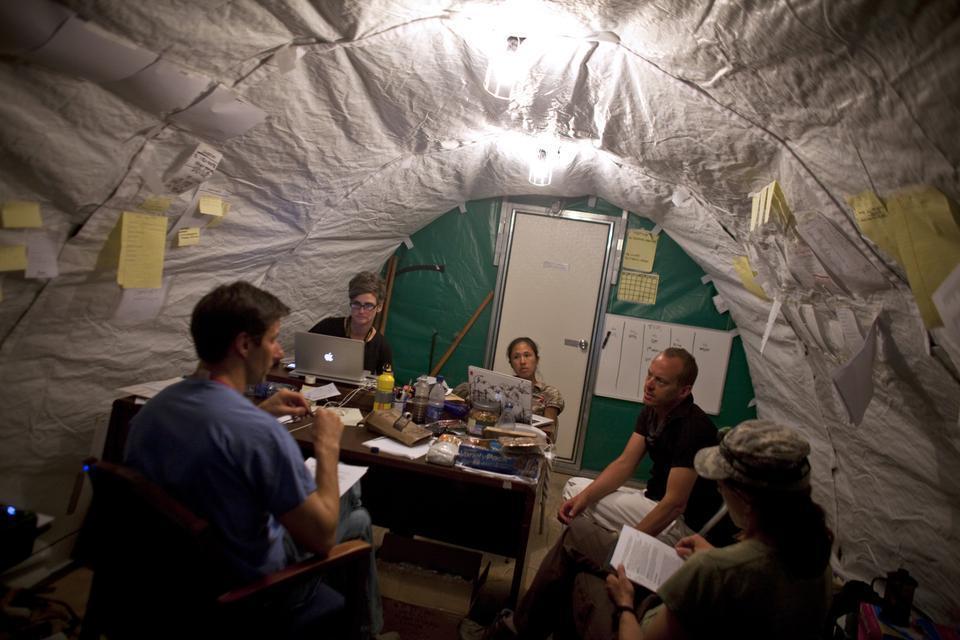
News
Summers Will Not Finish Semester of Teaching as Harvard Investigates Epstein Ties

News
Harvard College Students Report Favoring Divestment from Israel in HUA Survey

News
‘He Should Resign’: Harvard Undergrads Take Hard Line Against Summers Over Epstein Scandal

News
Harvard To Launch New Investigation Into Epstein’s Ties to Summers, Other University Affiliates

News
Harvard Students To Vote on Divestment From Israel in Inaugural HUA Election Survey
Harvard Duo Builds Hospital in Haiti
Harvard affiliates set up a rehabilitation center to help Haitians in need

Merely days after the devastating Haitian earthquake of Jan. 12, Stephanie Rosborough ’96 and Hilarie Cranmer arrived via helicopter to set up a field hospital near Port-au-Prince at an orphanage and school run by the organization Love A Child.
Rosborough, international emergency medicine specialist at Harvard-affiliated Brigham and Women’s Hospital, and Cranmer, assistant professor of global health and population at the Harvard School of Public Health, used their many years of experience in dealing with worldwide crises to mobilize the volunteers, resources, and supplies needed to set up a fully functional rehabilitation clinic in less than a week.
The Harvard Humanitarian Initiative—which provides training for disaster relief—helped to build the hospital and find funding for its construction, according to HHI Co-Director Michael J. VanRooyen.
The duo opted to set up a rehabilitation center rather than a primary care facility because of the nature of care required after earthquakes. Unlike other natural disasters, such as tsunamis, earthquakes cause extensive injuries that often require long-term orthopedic and neurological care, according to Rosborough.
“The types of injuries people have make it so that they need about three months of healing before they are able to mobilize themselves,” Rosborough said. “People in the thousands have nowhere to go after emergency treatment.”
The HHI-sponsored field hospital fills this treatment gap, and to date has provided care for at least 720 patients. At any given time, there are over 1,000 individuals in the hospital—about 700 are patients and their family members, and 300 are hospital staff and hired Haitian nationals, Cranmer said.
Cranmer and Rosborough planned to run the clinic for a minimum of six months before turning it over completely to local management, but they now think that they will likely remain in charge for a year. Their goal is “true re-integration” of the hospital into Haitian hands—rather than “just packing up and saying bye,” Cranmer said.
The main challenge they currently face is finding funding to keep the hospital running, primarily through private donations, the United Nations, and the United States Agency for International Development, Rosborough said.
“A lot of us are actually putting out our own personal cash,” Cranmer said.
The field hospital provides free treatment to all its patients, as well as meals and basic care for family members. When patients are discharged—most often to the refugee camp 15 minutes from the hospital—they receive a “Dignity Package” containing cooking supplies, clothing, food, diapers, and sanitary napkins.
Volunteers from the hospital also staff a small clinic at the camp to provide basic care and OB/GYN services, Cranmer said.
Patients who opt to return to Port-au-Prince—though cautioned against it—are supplied with tents, sleeping bags, and cab fare to enable safe and free travel, Cranmer said.
Despite the desperate need of the Haitian people and the challenges they will face in upcoming years, Rosborough and Cranmer said that they sense optimism in the air.
“Haitians love Haiti; a lot of people love Haiti and they want to see it rise from the ashes,” Rosborough said.
“A lot of people said ‘Look, maybe in a way this wipes the slate clean and will allow us to build things in a way that was better than before,” she added.
Want to keep up with breaking news? Subscribe to our email newsletter.
